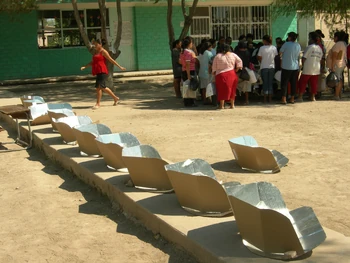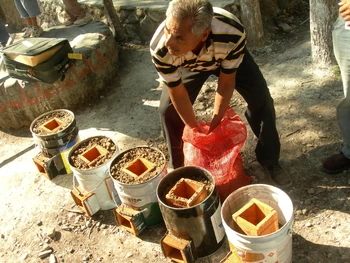Tom Sponheim (talk | contribs) |
Paul Hedrick (talk | contribs) mNo edit summary Tag: sourceedit |
||
| (37 intermediate revisions by 6 users not shown) | |||
| Line 1: | Line 1: | ||
| + | {{GoogleTranslateLinks}} |
||
| ⚫ | '''Club Rotario Torreón Centenario''' has been promoting the use of solar cooking since 2006. |
||
| + | {{Updated|11|5|14}} |
||
| + | [[File:MEXICO,_OCTOBER_2006_041.jpg|thumb|350px|Solar cooking class sponsored by Torreon Rotary Club in Torreon, Mexico by [[Wilfred Pimentel]]]] |
||
| + | [[File:Mexico_pictures_July_2008_119.jpg|thumb|250px|Solar-cooked corn bread]] |
||
| + | [[File:Mexico_pictures_July_2008_090.jpg|thumb|350px|Constructing a [[Rocket Stove]]]][[File:Mexico_pictures_July_2008_091.jpg|thumb|350px|Adding pumice insulation]] |
||
| ⚫ | '''Club Rotario Torreón Centenario''' has been promoting the use of solar cooking since 2006. The group sells solar cookers for 80-90 pesos, but when they are delivered to the communities, especially those in remote and rural areas, symbolic gifts are often accepted as payment. Dr. [[Irma Martinez]], vice president of Club Rotario Torreón Centenario, says that each cooker has a lifespan of 4 years even though they are constructed out of [[cardboard]]. She also says that the only maintenance required of the solar cookers is to keep them clean of dirt. |
||
| − | Without spending a penny on the purchase of gas, the housewives of the Comarca Lagunera may prepare their food daily with the help of sunlight. The food made in solar stoves will not only be cheaper but more nutritious by reducing the quantities of oil and water in their preparation. |
+ | Without spending a penny on the purchase of gas, the housewives of the Comarca Lagunera may prepare their food daily with the help of sunlight. The food made in solar stoves will not only be cheaper but more nutritious by reducing the quantities of oil and water in their preparation. |
| − | + | Dr. Martinez reports that since 2006 the club has been promoting the use of solar stoves, which work with a simple technology to prepare daily soup, tamales, meat, beans, cakes and a variety of foods without using fossil fuels, only solar energy. |
|
| − | In a visit made to |
+ | In a visit made to her house, we see that the solar stoves are made by hand. The solar cooking technology was introduced two years ago by the Rotary Club of Fresno California, responsible for promoting the technology throughout the Americas. |
| + | With a commercial price of 80 to 90 pesos, solar cooking not only offers the benefit of avoiding use of fossil fuels, but also that of saving water. Similarly it is not necessary to add cooking oil, the food cooks in its own juice. When cooking vegetables or meats there is no need to add water. |
||
| − | Opening his kit which comes to arm their mobile solar stove, explained that this technology was introduced two years ago by the Club of Fresno California, who are responsible for making the promotion of these teams throughout americas America. |
||
| + | The black cooking [[pot]] is placed inside a polypropylene [[bag]]. One puts 2-3 small sticks or smooth stones underneath the pot, in order to promotes heat circulation through the bottom of the pot. The polypropylene is closed with a string. |
||
| − | With a commercial price of 80 to 90 pesos, solar cooking not only offers the benefit of not using any fossil fuel is wood, coal, LP gas or natural, but cooking foods with little water, benefiting those communities with shortages this liquid or water is not purified. Similarly the application of oil is minimal, says the vice president, so that food is cooked in their virtually juices or using their own water, as is the case of eggs, where there is no need to put water to the saucepan. |
||
| + | Place the solar stove in the direction of the sun and when standing behind it, make sure your shadow falls behind the [[CooKit]] (solar stove). Re-orient the CooKit towards the sun after 1-2 hours. |
||
| − | Making reference to perform continuous visits to remote communities in the city and schools to publicize the advantages of using solar energy in food preparation, Martinez showed that the solar stove consists of a cardboard template that this coated paper aluminum. It is a weapon in a two by three, used to link two hooks for hanging clothes in tendederos. |
||
| ⚫ | |||
| − | Using a large bag of polypropylene, is opened and introduces a pot, preferably black color to attract more sunlight. Placing two wood underneath the pot, but inside the bag, which is looking for heat to circulate without obstruction. The bag is closed with a rope, doing a double knot to keep the heat out. This process works like the oven stove. |
||
| + | After an hour and a half, food will be done. Remember to use pot holders when removing the black pot from the polypropylene plastic bag to avoid burning yourself. |
||
| − | By placing the stove in front of the Sun, so that the shadow of the person covering the stove and only see her head on the floor, is the right direction for installation on the floor. We recommend placing a black bag underneath the stove to attract more rays from the Sun. According to the movement that takes the sun was anger rotating stove to that address. |
||
| ⚫ | |||
| ⚫ | |||
| ⚫ | |||
| − | After an hour and a half food will be ready, so always use a pair of gloves, since the pot with this technology can be heated over 100 degrees centigrade. |
||
| ⚫ | |||
| ⚫ | |||
| ⚫ | |||
| + | Some training also covers the construction and use of [[Rocket Stove]]s, which are fuel-efficient wood-burning stoves. |
||
| − | Despite that are made of cardboard, Martinez said that stoves have a lifespan of 4 years, as their saved is simple and requires only with a clean cloth to remove land it falls. |
||
| + | ==See also== |
||
| ⚫ | |||
| + | *[[Media:Rotary_Volunteer_Service_Grant_61804_2007.pdf|Rotary Clubs of Fresno and Torreon Centenario Volunteer Service Grant document]] |
||
| + | *[[Wilfred Pimentel]] |
||
| + | *[[Rotary Club of Fresno]] |
||
==External links== |
==External links== |
||
| Line 35: | Line 42: | ||
Dr. Irma Martinez Vacio |
Dr. Irma Martinez Vacio |
||
| − | Tel: +52 |
+ | Tel: +52 (871) 720-4547 |
| − | [mailto:generacion_72@yahoo.com.mx generacion_72@yahoo.com.mx] |
+ | Email: [mailto:generacion_72@yahoo.com.mx generacion_72@yahoo.com.mx] |
Dr. Lucero Mendez |
Dr. Lucero Mendez |
||
| − | Tel: +52 |
+ | Tel: +52 (871) 267-9096 |
[[Category:NGOs]] |
[[Category:NGOs]] |
||
[[Category:Mexico]] |
[[Category:Mexico]] |
||
| Line 48: | Line 55: | ||
[[Category:Hidalgo]] |
[[Category:Hidalgo]] |
||
[[Category:Haiti]] |
[[Category:Haiti]] |
||
| + | [[Category:Rotary Clubs]] |
||
| + | [[Category:I2N]] |
||
| + | [[Category:NGOs using CooKits]] |
||
| + | [[Category:Verified active 2014]] |
||
| + | [[Category:Requested update|2/8/16]] |
||
Revision as of 18:05, 8 February 2016
|
Last edited: 5 November 2014
|

Solar cooking class sponsored by Torreon Rotary Club in Torreon, Mexico by Wilfred Pimentel

Solar-cooked corn bread

Constructing a Rocket Stove

Adding pumice insulation
Club Rotario Torreón Centenario has been promoting the use of solar cooking since 2006. The group sells solar cookers for 80-90 pesos, but when they are delivered to the communities, especially those in remote and rural areas, symbolic gifts are often accepted as payment. Dr. Irma Martinez, vice president of Club Rotario Torreón Centenario, says that each cooker has a lifespan of 4 years even though they are constructed out of cardboard. She also says that the only maintenance required of the solar cookers is to keep them clean of dirt.
Without spending a penny on the purchase of gas, the housewives of the Comarca Lagunera may prepare their food daily with the help of sunlight. The food made in solar stoves will not only be cheaper but more nutritious by reducing the quantities of oil and water in their preparation.
Dr. Martinez reports that since 2006 the club has been promoting the use of solar stoves, which work with a simple technology to prepare daily soup, tamales, meat, beans, cakes and a variety of foods without using fossil fuels, only solar energy.
In a visit made to her house, we see that the solar stoves are made by hand. The solar cooking technology was introduced two years ago by the Rotary Club of Fresno California, responsible for promoting the technology throughout the Americas.
With a commercial price of 80 to 90 pesos, solar cooking not only offers the benefit of avoiding use of fossil fuels, but also that of saving water. Similarly it is not necessary to add cooking oil, the food cooks in its own juice. When cooking vegetables or meats there is no need to add water.
The black cooking pot is placed inside a polypropylene bag. One puts 2-3 small sticks or smooth stones underneath the pot, in order to promotes heat circulation through the bottom of the pot. The polypropylene is closed with a string.
Place the solar stove in the direction of the sun and when standing behind it, make sure your shadow falls behind the CooKit (solar stove). Re-orient the CooKit towards the sun after 1-2 hours.
The preparation of food varies not, in other words you can use your own recipe for making rice or a cake, but remember that the amount of water is slightly less than cooking on the stove top.
After an hour and a half, food will be done. Remember to use pot holders when removing the black pot from the polypropylene plastic bag to avoid burning yourself.
Training
Solar cookers training is done by a team of three, each person received training to manufacture them. The sales price is 80 to 90 pesos. In some remote communities, some small symbolic contribution is asked for.
So far 4,200 solar cookers have been built. Irma said they have done a promotion in many other communities besides La Laguna, such as in the states of Chiapas and Hidalgo, some have been sent to countries such as Haiti. The introduction of CooKits have brought good results.
Some training also covers the construction and use of Rocket Stoves, which are fuel-efficient wood-burning stoves.
See also
- Rotary Clubs of Fresno and Torreon Centenario Volunteer Service Grant document
- Wilfred Pimentel
- Rotary Club of Fresno
External links
- Cocina solar, una opción económica - El Siglo de Torreón
Contact
Dr. Irma Martinez Vacio
Tel: +52 (871) 720-4547
Email: generacion_72@yahoo.com.mx
Dr. Lucero Mendez
Tel: +52 (871) 267-9096
